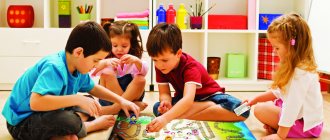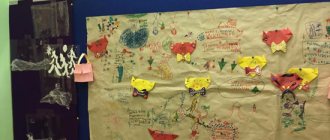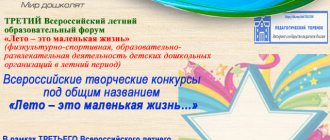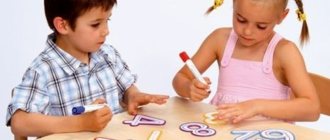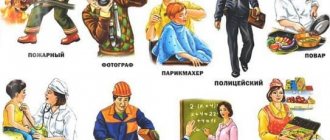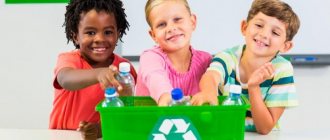Individual educational route for a child with disabilities
Individual educational route for a child with disabilities
Child's full name: Platon Z.
Date of Birth:
(child 5 years old).
Date of compilation of the IOM: 08/30/2018 Parents:
Brief description:
Difficult adaptation upon entering the middle group, difficult separation from parents, crying, reluctance to make contact with children and adults. The development of fine and gross motor skills does not correspond to the age norm. Coordination, tempo, and rhythm of movement are impaired. During group educational activities, he does not show interest in what is happening (runs, jumps), it is difficult for him to concentrate on something for a long time, he is distracted; involuntary attention predominates. Speech development does not correspond to age norms.
Communication and speech disorders: inability to express one’s thoughts when communicating with teachers and peers, decreased need for communication, underdevelopment of play activities - does not know how to support the game, prefers to be alone, does not make contact with children, does not accept the rules of the game.
Target:
Formation of communication and speech skills through continuous support at all stages of stay in kindergarten.
Tasks:
- Improve communication skills through participation in joint gaming and educational activities.
- Develop and enrich the child’s emotional experience.
- Develop cognitive processes aimed at fostering cooperation and a friendly attitude towards peers and adults.
- Provide methodological assistance to parents in supporting their child.
Forms of interaction
: involvement in educational and gaming activities, joint educational and gaming activities with parents, individual work. Following the recommendations of a psychologist, speech pathologist, music director.
Activities:
communicative, gaming, cognitive-research, perception of fiction and folklore, visual, musical, constructive, motor, self-service and basic household work.
Expected result
: Increasing the level of social and communicative competence, the level of self-esteem.
Forms of work with parents:
consultations, individual conversations, exchange of experience in interacting with a child, parent meetings (round table)
.
Diagnostic stage
| Individual curriculum aspect | Strengths | Difficulties |
| Communication | Interacts in communication with adults in individual lessons. | Speech communication skills are not correspond to the age norm. Does not try to interact with children both in play and when working in a team. |
| Physical development | Shows interest in gaming activities. | The skills of picking up, holding, carrying, putting a ball, jumping on two legs, moving forward, crawling under a tight rope have not been mastered |
| Social skills | Shows interest in children. | Does not feel the desire to share a toy with peers, shows a strong emotional reaction, and strives to break what the children have built. |
| Cognitive development | Distinguishes colors and shapes. Counts to 10 using visual aids. | He is not active in class. Distracted when completing tasks. Shows interest only in the topic of technology, but does not listen, but tells an adult the same thing information. Fine motor skills are not developed. |
| Artistic and aesthetic development | Repeats simple drawings. | Fine motor skills are not developed. A child can only use it with the help of an adult. scissors. Can draw for a very short time and loses interest. |
| Speech development | Knows the content of many fairy tales. Shows interest in speech development games during individual lessons. | Difficulties in memorizing, composing a story using pictures and diagrams, and retelling. |
| Skills needed for life | Cultural and hygienic skills are not formed | Does not follow the sequence when putting on clothes, waits for an adult’s prompt. |
Individual route of psychological and pedagogical support
| Specialist | Tasks | Contents of the activity |
| Teacher speech therapist | To develop coherent speech skills and skills to respond to addressed speech. | Games: “Who called me?”, “Magic chest”, “The fourth wheel”, “Call me affectionately”, “Remember and repeat”, “Who needs what?” Articulation gymnastics, breathing exercises. Games: “what sound?”, “Clap your hands if you hear a given sound.” Conversations based on pictures: “Our group”, “Autumn”, “Orchard”, “New Year Tree” |
| Teacher - psychologist | Develop positive responses to social contacts. Form the need for emotional contacts with others. | Games to develop communication skills: “You and I have become friends”, “Your hand, my hand”; Games to develop contact: “Pet the cat”, “Play with the doll” Exercises: “Saying goodbye to each other”, “Polite words” |
| Educator | Create conditions for the development of a child’s positive attitude towards himself, other people, the world around him, communicative and social competence of the child Form ideas about the objective world. Develop visual perception and fine motor skills. | Games: “Show me the object I tell you” “More is less”, “Wonderful bag”, “Assemble according to the diagram”, “Complete the drawing”, “Color according to the instructions”. A set of exercises to develop fine motor skills. Involvement in theatrical games. Involvement in performing health-improving gymnastics. Creation of diagrams - pictures with an algorithm for performing certain actions: dressing, rules of behavior, cultural and hygienic skills. |
| Musical director | Develop phonemic awareness. | Exercises: “Big and small legs”, "Hedgehog and Drum" Speech therapy chants: “Sparrow”, “Song for the Baby”, “Chicken”. Dynamic exercises: “Bear Cubs”, “Mushroom Picking”, “Bunny” |
| Physical education instructor | Develop motor skills that improve coordination movements. | Games: “Catch Up”, “Birds and Cat”, “Sparrows”, “Crossing”. Various types of walking, rolling and catching the ball. |
| Activities | ||
| Types of difficulties (pedagogical symptoms) | Causes of difficulties | Contents of correctional work (activities of the teacher) |
| Personal: Inadequate attitude towards oneself: self-esteem, self-acceptance | Lack of formation of ideas about oneself, the image of the Self. | Conversations on the topic: “What we can do, what we will learn.” Games: “I love you - I don’t love you”; "Who will I become"; "Tender name" Conversations about the real and possible achievements of children. Games: “I can”; “Guess who is which”; "My future"; "If I were a star." |
| Drawing on the topics: “Drawing a name”; “My funny portrait”; “Palm of Achievement”; "Flower of Qualities" | ||
| Games: “Negotiate the offer”; "Who do I look like?" Play massage “What? Where? | ||
| Anxiety, lack of confidence in one’s capabilities, abilities, or lack of self-criticism | Preliminary acquaintance with the upcoming activity, difficult task. Praise, support. Elimination of competitive moments. | |
| Psycho-gymnastics. Role-playing games. Games (in the absence of self-criticism): “Guess what mom (friends) like” Exercise “I can’t - I can - I can.” | ||
| Psycho-gymnastics. Games: “Let's talk”; "Magic glasses"; "A Journey Through a Painting." | ||
| Thematic drawing taking into account the child's difficulty. Facial exercises (expression of emotional states). | ||
| Violation of moral norms and rules of conduct. | Unformed ideas about moral qualities and ethical requirements. Lack of external norms and restrictions | Design of the corner “Our good deeds”. Reading literary works, conversations on ethical topics. Game "Invitation to Visit". Solving problem situations: “On a polite bus”; "How to proceed". Games: “Circle of Good”; “Who gave kind words”; "Ring of Friendliness" Exercise "Garbage Bin". The ABC of polite phrases (drawing proposals). Games: “Say hello |
| differently"; "Give thanks in different ways" | ||
| Communicative: Difficulty interacting with adults | Inadequate self-esteem | Creating a situation of success. Involvement of an adult as an assistant. Development of a step-by-step reward system (chips, points, etc.) Use of non-verbal reflective techniques. Playing out problematic situations. Games: "Tender Paws"; "Repeat after me"; "Magic glasses". S. Cherny "Brave men". |
| Reduced level of proficiency in independent communicative actions organizational, perceptual, operational | Training in the ability to work using an algorithm. Introduction of a rule-scheme for communicative activities (verbal, visual). Games: “Repeat the task”; "Say it in to another." Working with tools (symbols). Work in pairs with an adult. Games: “I am the word, you are my word”; “Correct the error”; “Make a sentence or flip.” Involving the child in activities. | |
| Poorly developed verbal communication skills | Conversations on the topics: “We say hello”; “How to make a request”; "What what to do if you are lost? Creating problem situations with three possible answers (the child must choose one). Games: "Interview". Games using the telephone conversation method: "Call Mom"; “Call the store.” Dialogues on lexical topics. Mastering speech patterns in interaction with an adult, changing roles. | |
| Difficulty interacting with peers | Inadequate self-esteem | Work assignments in pairs (triples, teams). Development of the “Most Friendly Couple” reward system. Role-playing games. "Compliments to a friend." Games and round dances with dialogues Games to develop adequate self-esteem: “Hot chair”; “I am strong, smart, brave”; “I can, I want, I can.” "Sculptors"; Organization of mutual verification of task completion. Exercise “Praise for...” "Draw in pairs with |
| ...”, “Put the word together with ...” Vocabulary enrichment games | ||
| Inability to express one's thoughts when communicating with others teachers. Inability to express one's thoughts when communicating with peers | Insufficient development of mental operations | Games and exercises for development thinking: “It flies - it doesn’t fly”; “I know five...”; "Tricky questions." Game “Name the similarities and differences between two objects.” |
| Lack of formation of sound pronunciation, vocabulary, grammatical structure of speech | Sound automation work. Psycho-gymnastics, emotional mood, increasing confidence, relieving anxiety. The game “Making a story in a circle” in pairs with a child or teacher. Logorhythmics. A game “Finish the sentence.” Game "Say it differently." | |
| Lack of formation of voluntary attention processes | Games with rules like “Don’t say yes and no, don’t give black and white” are for everyone, but on different materials. Games for attention Games: “Give a task to an adult” (continue the pattern; graphic dictation; search with orientation - find a toy). Tasks aimed at searching, highlighting information, comparing objects on given grounds. | |
| Poorly developed skills in mastering paralinguistic means - facial expressions, gestures, intonation | “Tell” poems with your hands. A game "Parrot". Theatricalization, sketches. Psycho-gymnastics for expressing emotional state. Games with a mirror. Game "Say it in different ways." Games for intonation. Games for highlighting one word with your voice | |
| Inability to find ways to resolve conflicts | Lack of social responsibility, ability to feel, understand oneself and another man | Reading fiction. Watching cartoons followed by discussion. Playing out problematic situations. Games: “Take his place”; "Magic glasses"; "You look like…"; "Back to back". Emotion training using phrases: “Come here”; “Don’t bother me” (learn to pronounce phrases with different intonations: rudely, affectionately, |
| offensive, etc.) | ||
| Inadequate self-esteem | Analysis of conflict situations. A game "Good bad". Teaching children constructive ways to resolve conflicts. Analysis of problem situations using a series of plot pictures. | |
| Activity is chaotic, ill-conceived, uncontrolled | Lack of development of the ability to realize specific cognitive goals | Reflection of activity. Games with constructor, mosaic. All types of lotto, dominoes. Exercise “How are they similar and different?” “Pairs of pictures”, “Pairs of words” Game technique “Remember and name”, “Find out what we wished for?”. |
| Inability to find means and ways to achieve goals in the process of activity. | Game “Which fairy tales are we from?”, Game “Seasons”, Games with building materials (based on a model, diagram). Game technique “Orders”. | |
| Inability to exercise control and evaluate performance results | Game "Quartet", Game "Find track", "Loto", finger game. Game "Assemble a pyramid" "Laying out mosaic patterns." Find and circle exercise, Game “Decorate the napkin as I say.” Game “What are their names?”, Exercise “Listen, answer and tell.” |
Interaction with parents
| Consultations | “What parents of a child with disabilities need to know” “Age characteristics of children 5 – 6 years old” “The importance of the development of fine motor skills of the hands for children’s speech” “Using counting rhymes for speech development” "Interesting games for developing attention" |
| Cooperative activity | Participation in joint projects, preparation for holidays, entertainment, implementation of recommendations of specialists. |
An individual educational route is designed for 1 year.
Individual and group educational activities take place in accordance with the schedule and distributed load. Each specialist documents his work. Pedagogical and psychological diagnostics are carried out through: observation, games, conversations, analysis of performance results.
Modern parenting
In recent years, new values for raising children have taken shape in our country. Education, including preschool, has become more focused on the individual child, his characteristics, his interests and abilities.
The modern educational system is structured in such a way that every preschooler and schoolchild participates in the educational process to the maximum; teachers conduct dialogues and work with each child, regardless of character traits or psychophysiological characteristics.
Finally, nowadays it is no longer common practice to evaluate children in relation to each other. It is much more productive not to compare a child with other children, but to compare him with himself in the past: what progress a particular child was able to achieve over a certain time and how he changed in relation to himself.
Children may be the same age, but due to different rates of development, one child may correspond to the level of “preparatory”, while another, for example, will retain the features of a 3-4 year old child.
Who needs IOM?
These are mainly children of the following groups:
- Children with organic disorders, that is, those who have hearing, vision, and musculoskeletal impairments.
- Children with severe medical illnesses, especially those who frequently miss school while in the hospital or home schooled.
- Children with significant mental retardation.
- Children with autism spectrum disorder.
- Children with mental retardation.
- Hyperactive children - if their activity interferes with the educational process.
- Gifted children.
For what period of time should an IOM be compiled? Usually routes are drawn up for 1 year, but if the teacher is not confident in the abilities and capabilities of the child, then you can first draw up an IOM for 3 months.
Why are children different?
However, why do some children need individual educational routes at all? How does the individuality of children manifest itself?
First of all, Maria Tokmyanina notes, the most obvious difference between children is in the level and characteristics of their physical development, physical fitness, as well as in the elementary speed of growth and maturation.
The latter is especially acute among preschoolers. Children may be the same age, but due to different rates of development, one child may correspond to the level of “preparatory”, while another, for example, will retain the features of a 3-4 year old child.
In this case, both children can be absolutely healthy, and the speed of their development is a common genetic feature that will smooth out over the years. In this case, both a child with delays in growth and development, and a child who is ahead of his peers, need a special, individual approach.
Photo source: Lukas / Pexels
In older groups of kindergarten and in elementary school there may be other problems: different amounts of knowledge and skills. For example, children from early developmental groups with a large amount of learned skills came to the preparatory class, as well as children with whom no one had professional training.
Among other things, children have different speeds of processing and perceiving information, as well as different levels of fatigue. Some children quickly remember information and reproduce it efficiently, but at the same time they quickly become exhausted. For other guys, the process of assimilation of information is not so simple, but they are ready to study diligently for a long time.
And, of course, the most important thing is that the groups include children with disabilities. They, as a rule, most need individual educational routes.
